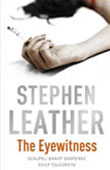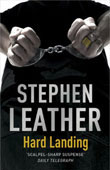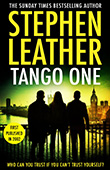The Eyewitness - Stephen Leather


The idea for The Eyewitness sprang from my friendship with Gordon Bacon, a former north of England policeman who heads up the International Commission on Missing Persons in Sarajevo. Gordon and his team identify the war dead in the Balkans using state-of-the-art DNA profiling. Police contacts of mine had told me that a large number of prostitutes from Eastern Europe were flooding into the UK from the Balkans, and it seemed to me that I could produce an interesting book by combining the two themes - massacres in the Balkans, and human trafficking.
Gordon told me of a case where a refrigerated truck full off Muslims had been driven into a river and that was the starting point for The Eyewitness, a horrific massacre with one young girl, the eyewitness of the title, on the run from the killers.
STEPHEN LEATHER WRITES
I spent a week with Gordon in Bosnia where I met with several police officers and UN workers. I visited several brothels in Bosnia and Croatia, and spoke to girls working there. In London I spoke to crime reporters and police officers, and met dozens of working girls and their maids.
In all I probably spoke to forty working girls, from high priced escorts to girls in Soho walk-ups who spoke little English. Many were from countries such as Lithuania, Poland, Russia and Slovakia. I didn’t meet anyone who would say that they were forced into prostitution, and while that definitely does happen all the girls that I met had made a choice to sell themselves. It was in effect a career choice. The fact that so many of the working girls are from abroad, and especially from poorer countries, is because they can earn more in London in six months they could in ten years back in their own countries. A girl working for a big London escort agency can easily earn £200,000 in a year.
Most decide to work for a set period of time, a few years at most, and save their money to set up their own business back in their own country. Some of the foreign ones end up marrying clients. Most do not see it as a long-term career. The ones that do stay on the game for many years are the ones with drug problems or with a pimp, as both drugs and pimps prevent them from saving their earnings.
Prostitution is already legal in the UK. A woman who accepts money for sex is not breaking the law. As explained in the book, it is the offering sex for money - soliciting - or offering money for sex - importuning - that breaks the law. The act itself is legal. The law allows for a prostitute to work from a flat, but not more than one. Though she is allowed a maid who can answer phones and show callers in and out. More than one working girl in a flat means it is classed as a brothel and is therefore illegal.
Providing the girl isn’t being coerced, and she’s not underage, and providing that everything that takes place is consensual, then I personally don’t see that there is a problem. Even the police seem to accept this. A girl working on her own from a flat is never hassled. Vice are more interested in organised prostitution, girls who are being abused, and illegal immigrants, as well as getting prostitutes off the streets.
In my opinion the business should be totally legalised and regulated. Escort agencies could be sold licences, their girls would be taxed and have to have weekly/monthly medicals, and VAT would be charged. (A lot of prostitutes are already registered for tax as they know they will have more problems with the tax authorities than with the police).
I also don’t see why working visas couldn’t be issued to girls from overseas who wanted to work as prostitutes in the UK. That way they could also be regulated, taxed, and medically checked. At the moment the foreign girls are working illegally and so tend to avoid health checks, or talking to the police if they are robbed or abused. Regulation would also solve that. Regulation would offer protection to both parties, to the girls and to the customers. Just my opinion! Anyway, my research was an eye-opener, both to the horrors of the ethnic cleaning in the Balkans, and to the mechanics of internet prostitution, and I certainly think I produced a memorable thriller!
The Eyewitness Reviews
"Atmospheric suspense set in Sarajevo’s killing fields." The Daily Mirror
"BRUTAL TALE OF THE EVIL TRADE IN PEOPLE; MORE MONEY IS SPENT ON PROSTITUTION THAN GOING TO THE CINEMA. STEPHEN LEATHER TELLS ANNE SIMPSON OF THE CHILLING RISE OF SEX TRAFFIC FROM THE BALKANS"
"There is an icy moment in Stephen Leather's latest thriller when his hero, Jack Solomon, asserts a creed of calloused sensibility. 'You won't go far wrong,' he says, 'if you believe people are basically evil.' On almost every level Leather's book, The Eyewitness is pertinent, exploring the contamination which seeps into innocent lives when ripped open by violent social upheaval."
"At its core is the hideous gangsterism of people-trafficking, with its inter -linked rackets of money-laundering and high and low-grade prostitution. Solomon, a former London detective, is working in the Balkans with an agency dedicated to identifying the war-dead. His particular mission is to trace the only remaining witness to a massacre by Serbs, in which 21 members of a single Albanian family 'simply vanished'. He tracks the survivor to London where liberty for this 19-year-old girl now means selling herself for sex, and its ruthless, powerful web of danger."
"It is a grim, suspenseful tale and we, the readers, know from almost daily news stories that Leather's plot is disturbingly close to fact. Recently 10 prostitutes from Kosovo, Moldova, Poland, and Thailand were detained by Strathclyde Police in simultaneous raids on Glasgow premises, but almost weekly police break up call-girl networks operating throughout Britain, from plush Mayfair addresses to sauna parlours in Manchester and Scotland. Research into the vile big business practices of gangster overlords led Leather himself into all sorts of bandit territory, from the shattered remnants of Yugoslavia to the clubs of south-east Asia. But does an author so focused on the potency of wickedness for fictional purposes come to share Solomon's bleak view of humanity? There is a long intake of breath before Leather replies with an emphatic no, and then he adds: But terrible, terrible things do happen in our world and quite often it is fundamentally good people who are the perpetrators."
"This observation contains an even sharper chill than Solomon's, so at what point does Leather think decent people step over the line into barbarity? In Sarajevo he spent time with the International Commission on Missing Persons which, in this, his fourteenth, novel, becomes the International War Dead Commission. That's the question everyone must ask themselves. Bosnia -Herzegovina is at most a three-hour flight from London."
"The people there are not all that different from us yet they marched men, women, and children out of villages and took them into forests, mowed them down with machine-guns, buried them, then dug up the bodies again to mix them up in different mass graves elsewhere to make identification harder. We may wonder about the sort of people who would do that, muses Leather. We may agonise over whether we would be capable of such appalling hate. I would like to think that I would be among those who would stand their ground and say, 'This mustn't happen'. But that doesn't always seem to be the case when the group mentality takes over. People together will carry out the most tremendous atrocities while, as individuals, they might never commit a crime. That's the very scary thing."
"In a dozen or so years he has gained a sizeable international reputation as a thriller writer whose fast, unvarnished prose is a natural spin-off from his time in journalism when he worked for publications including The Herald, the Times, Daily Mail, and the South China Morning Post in Hong Kong. From his latest investigative sources he possesses some astonishing data, the starkest information being that in the UK more money is now spent on prostitution than on cinema-going. In financial terms that's £770 million on prostitution as opposed to £400 million on taking in a movie."
"There are girls queuing up right across central and eastern Europe to come here because they can make big money quickly. For them prostitution is a career choice, a means to financing a better life back home but something they wouldn't necessarily pursue in their own countries for reasons of shame. Most foreign girls, he says, are brought into Britain on false papers by people -traffickers, after probably telling their families they were planning to stay here as language students or waitresses. The traffickers call themselves agencies, and the girls are contracted to them. But one student, two years into a law degree in Poland, told me that she went to the British Embassy for a six -month visa, having already signed up with a language school in London"
"Within a day of arriving she had a flat near the Edgware Road and was working as a call girl. She had estimated that during her stay she would earn enough financial security to see her through the rest of her degree. By contrast, the British prostitutes whom Leather interviewed seemed blighted with self -loathing, their work usually a frantic means of funding drug addiction."
"Leather's field work for The Eyewitness also took in the turf wars erupting now in Britain, battles which have convinced him that the rise in gun violence is often linked to foreign mobsters who, in the guise of political refugees, do manage to steal through our inept and cumbersome bureaucracy. Once here, vast numbers of mafia types from the former eastern bloc and Russia re-activate their criminal contacts and start making colossal money from escort agencies and drugs."
"As a result, trafficking in human beings is now a more profitable growth industry than actually dealing in drugs. The penalties for smuggling in people are much less than for drug trading. A person desperate to reach Britain might pay $ 10,000, and the trafficker might bring in up to 20 people at a time, with very little risk of him getting caught. And if he is caught, the maximum penalty will be five years, with most offenders getting out in 18 months. For the drug trafficker it could be five, 10, or 20 years."
"Back in Thailand, recently, Leather was standing before that reconstructed bridge of infamy over the River Kwai when a Japanese sight-seer, one among thousands, asked him politely if he would mind stepping aside slightly so that the man could assemble his eight companions for a photograph. Leather obliged and the group duly beamed into the camera, no trace of awareness on their faces that this very location had once been poisoned by brutality."
"Yet the visual evidence is still there in hundreds of graves on the river bank, those row upon row of headstones dedicated mainly to the British and Dutch soldiers who perished at the hands of the Japanese while beaten into building the Kwai's original railway bridge during the Second World War. Two hours out from Bangkok, and you can join a passenger boat which carries you past temples and caves, all good stuff for souvenir pictures. And nobody seems to notice the war graves or exclaim, 'Oh, God, how horrific'. What happened 60 years ago appears to have been forgotten."
"The carelessness of memory is a reminder of how easily history gets ploughed over to become lost in something else - in this case a teeming extension of Thailand's happy, snappy tourist industry. But then, as Stephen Leather reflects, who can truly blame any of us just now for setting our sights on the least harrowing aspects of our imperilled world?" Copyright 2003 Scottish Media Newspapers Limited - The Herald (Glasgow)








